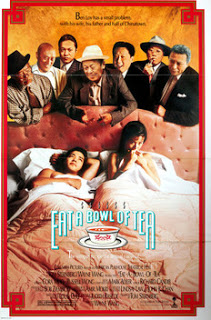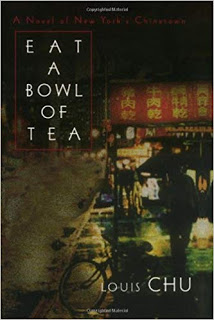Director: Wayne Wang
Year: 1989
Rating: 5.0
Wayne Wang directs his third foray into the Chinese
American community after the films Chan is Missing and Dim Sum: A Little
Bit of Heart, but this time he dips back into the past to tell a very unique
slice of history. Beginning in the 1800's Chinese males, for the most part,
had immigrated to America to work on the building of the railways and for
other jobs during the Gold Rush. The intent of many of them was to make enough
money to then go back to China and take care of their families. But many
stayed behind and were in America when the US Government passed The Chinese
Exclusion Act of 1882 that prohibited all Chinese Immigration. California
was freaking out. This stayed in effect for decades and was reinforced by
the Immigration Act of 1924 which for the most part banned all new immigration
from Asia. But along came WWII in which China was our ally and in which many
Chinese-Americans enlisted to fight and so these acts were done away with.
These laws had had the effect of creating a Chinese demographic in the USA
in which the men far outnumbered the women. This is where this story takes
up. But first a word or two about the cast.
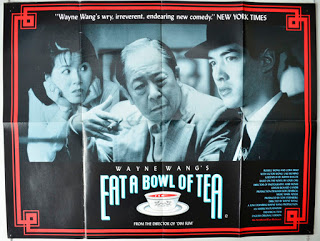
For those who have followed Hong Kong cinema, they will spot many familiar
faces in the film. The lead Russell Wong only appeared in a handful of Hong
Kong films (Porky's Meatballs and Satin Steel), but his brother Michael was
very popular for a number of years. The co-lead is Cora Miao born in Shanghai
and who starred in three 1980's Ann Hui films along with Chow Yun-fat (The
Story of Woo Viet, Love in a Fallen City and Boat People). She was also in
Wang's Dim Sum and ended up marrying Wang and basically retiring from film.
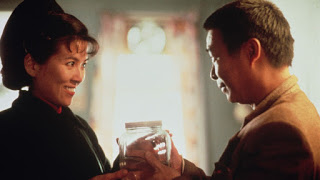
In smaller roles there is the omni-present Helena Law Lan as an Auntie. She
has over 450 credits in Hong Kong films. Philip Chan who has both directed
and acted (usually it seems as a cop) in numerous Hong Kong films. He gives
the speech at the wedding. The father of Cora is Lau Siu-Ming who has been
in loads of Hong Kong films; often as the villain - he was the tree demon
in A Chinese Ghost Story. Hui Fan who is Russell Wong's mother in the film
had many small parts in HK films - a bigger role here actually than in most
of them. The woman who gets surprised in bed is none other than Lydia Shum,
a legendary comic actor. The slick seducer and villain of the film is a surprisingly
sleazy but charming Eric Tsang who is all over Hong Kong film in so many
ways. And even Victor Hong (Russell's father) who has been in many American
films still showed up in a few films from Hong Kong. So for Hong Kong film
fans this was a surprising smorgasbord of faces I wasn't expecting to see
but was quite pleased to do so.
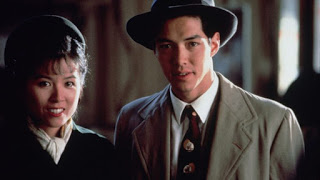
The film itself though is rather disappointing - a fairly unpleasant and
down beat story that I wasn't expecting from Wayne Wang. Not the comic or
sentimental touch that I know him for in these early films leading up to
Joy Luck Club. Two fathers get together and decide that a son of one should
marry the daughter of the other. She is back in China, so Russell goes back
to meet her - and quickly falls in love. Before then he had been carousing
with white prostitutes. He brings Cora back to NYC, has a big dinner in his
honor, gets a job as the manager of a restaurant and all seems fine. But
not in the bedroom unfortunately. He gets performance anxiety and begins
getting pressure from an unhappy Cora and family members waiting for the
first child. Now this could have been played with a light comic sentiment
but Wang doesn't. It all goes to hell though a happy ending is artificially
tacked on. I never quite figured out what the point of the film was. The
peripheral aspects that explored the community were quite interesting but
the core of the film just felt sour.
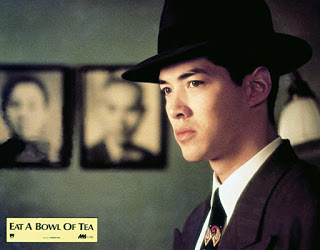
The main problem though with the film may be Russell Wong. He became a pretty
good action actor later on, but he is dreadful in an emotional drama like
this. He goes through the film with two expressions - smiling and looking
sullen. There is no chemistry between him and Cora. He looks so uncomfortable
on the screen at times. It also seems strange that when he goes to China
where everyone is speaking Cantonese, he understands it we are told but can't
speak a lick of it (his brother Michael wasn't much better being dubbed in
his early films in Hong Kong) - so we get these scenes in which his mother
and Helena Law Lan are speaking Cantonese and he is speaking English and
they somehow understand him. You have to wonder why Wang could not have found
an actor who would have fit this role better. The film is based on a book
of the same title by Louis Chu.
